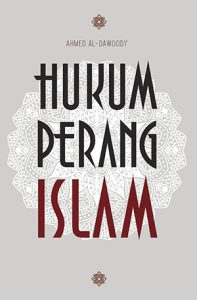Hukum Perang Islam

Author: Ahmed El-Dawoody
Publisher: Kepustakaan Populer Gramedia
Year of Publication: 2019
Print Length: 480 pages
Language: Indonesian
Genre: Islamic Studies / Dawah & Applied Science; Islamic Law and Jurisprudence, Science; Non-Fiction / Law
Topic: Islam, Qur’an, Law, Jurisprudence, Legal Theory; Law Enforcement, War, Peace, Jihad, Arms & Weapon, Battle & Conquest, Othering & Otherness
Throughout history, war and conflict have occurred across every era. Islam, with its rich tapestry of civilization, addresses these challenges by presenting a mosaic of legal principles derived from the core sources of Islam (the Qur’an and hadith) and the scholarly ijtihad. Ahmed al-Dawoody, Legal Advisor and Islamic Jurisprudence expert at the International Committee of the Red Cross (ICRC), delves into this subject through this book.
Perang dan konflik telah mewarnai semua periode sejarah. Agama dan peradaban Islam pun menyikapinya dengan mengajukan berbagai aturan hukum terkait, berdasarkan sumber-sumber utama Islam (al Qur’an dan hadis) dan ijtihad para ulama. Ahmed al-Dawoody, Penasehat Hukum dan Yurisprudensi Islam di Komite Internasional Palang Merah (ICRC), mengupas kajiannya dalam buku Hukum Perang Islam.
Table of Contents
Kata Pengantar (Foreword)
Prof. Dr. M. Din Syamsuddin / Khaled Abou El Fadl
Ucapan Terima Kasih (Acknowledgments)
Tabel Transliterasi (Transliteration Notes)
Pendahuluan (Introduction)
Dasar Pemikiran (Framework)
Tujuan Buku Ini (Objective)
Pertanyaan Penelitian (Research Questions)
Ruang Lingkup dan Batasan (Scope and Limitations)
Metodologi (Methodology)
Struktur Buku (Book Outline)
1. Perang Zaman Nabi Muhammad (War in the Time of the Prophet)
Pendahuluan (Introduction)
Persoalan dalam Kajian Sirah (Problems in Sirah Studies)
Periode Mekah (Mecca Period)
Periode Madinah (Medina Period)
Ghazawât Nabi (The Prophet’s Gazawat):
Berdakwah dan Membuat Pakta Perdamaian (Da’wah and Making A Peace Pact)
Serangan terhadap Muslim dan Serangkaian Insiden (Attacks toward Muslims and Various Incidents)
Sârâyâ
Membangun Teori Peperangan Nabi (Building on The Prophet’s Theory of War)
Kesimpulan (Conclusion)
2. Justifikasi Perang dalam al-Qur’an (War Justification in the Qur’an)
Pendahuluan (Introduction)
Teks dan Konteks al-Qur’an (Texts and Contexts of the Qur’an):
Teori Tindak-Tutur (Theory of Speaking and Acting)
“Orang Lain” di Mata Muslim (The Others from Muslims’ Perspective)
Susunan al-Qur’an (Composition of the Qur’an)
Ayat-ayat Makkiyah dan Madaniyah (Meccan and Medinan Verses)
Disiplin Ilmu al-Qur’an (Qur’anic Studies)
Pendekatan terhadap al-Qur’an (Approaches toward the Qur’an):
Pendekatan Superfisial (Superficial Approach)
Pendekatan Perantara Selektif (Selective Medium Approach)
Pendekatan Berbasis Disiplin (Discipline-Based Approach)
Teks al-Qur’an tentang Perang (al-Qur’an Texts About War)
Casus Belli al-Qur’an (An Act or Situation that Justify War from the Qur’an)
Kesimpulan (Conclusion)
3. Justifikasi Yuridis Perang (Juridical Justification of War)
Pendahuluan (Introduction)
Syariah atau Fikih (Shari’a or the Fiqh)
Persoalan Jihad (On Jihad):
Jenis-jenis Jihad (Various kinds of Jihad)
Justifikasi “Orang Dalam” (“Insider” Justification)
Klasik dan Kontemporer atas Perang (Classics and Contemporary over War)
Pembacaan “Orang Luar” terhadap Jihad (“Outsiders”‘ Reading toward Jihad)
Pembagian Dunia dalam Fikih (World Classification in Fiqh):
Dâr al-Islâm / Dâr al-‘Adl / Dâr as-Sâlam (Negeri Islam / Negeri Keadilan / Negeri Perdamaian — The Land of Islam / The Land of Justice / The Land of Peace)
Dâr al-Hârb / Dâr al-Jaur (Negeri Perang / Negeri Ketidakadilan, Penindasan — The Land of War / The Land of Injustice, Oppression)
Dâr as-Shulh / Dâr al-‘Ahd / Dâr al-Muwada’ah (Negeri Perdamaian / Negeri Perjanjian / Negeri Rekonsiliasi — The Land of Peace / The Land of Agreement / The Land of Reconciliation)
Conclusion
4. Hukum Humaniter Internasional Islam (Islamic International Humanitarian Law)
Pendahuluan (Introduction)
Imunitas Nonkombatan (Non-Combatant Impunity):
Perempuan dan Anak (Women and Children)
Orang Lanjut Usia (Elderly)
Orang Buta, Sakit, Penyandang Disabilitas, dan Majenun (The Blind, the Sick, the Disabled, and the Mad)
Rohaniwan (Clergy)
Al-‘Asîf, Petani, Pengrajin, dan Pedagang (Farmers, Craftsmen, Merchants)
Perisai Manusia (Human Shield)
Serangan Malam (Night Raid)
Mutilasi (Mutilation)
Senjata (Weapon)
Penghancuran Harta Benda (Destruction of Property)
Jaminan Keamanan (Guarantee of Safety):
Siapa yang Dapat Memberi Amân? (Who Can Provides Safety?)
Prosedur Pemberian Amân? (Safety Provision Procedure)
Durasi dan Penghentian Amân (Duration in providing security and when to stop)
Hak dan Kewajiban Musta’min (The Rights and Obligations of those who are provided with security)
Tawanan Perang (War Captives):
Perlakuan terhadap Tawanan (Treatments toward Captives)
Kesimpulan (Conclusion)
5. Permusuhan dalam Negeri dan Terorisme (Hostilities within a Country and Terrorism)
Pendahuluan (Introduction)
Perang Melawan al-Bughâh (War Against Rebels)
Apakah Pemberontakan Dibenarkan dalam Hukum Islam? (Is Rebellion Justified in Islamic Law?)
Peraturan Mengenai Perang Melawan Pemberontak (Rules on War Against Rebels)
Imunitas Nonkombatan (Non-Combatant Impunity)
Senjata dengan Dampak Kerusakan Luas (Weapons with Mass Destruction)
Tawanan dan Sandera (Captives and Hostages)
Legitimasi Kekuasaan Kaum Separatis (Legitimacy of Separatist’s Power)
Tanggung Jawab atas Kehancuran Kehidupan dan Harta Benda (Responsibility on the Destruction of Life and Property)
Hukuman untuk Pemberontakan? (Punishment for Rebellion?)
Perang Melawan al-Muharibûn / Quttha’ al-Thariq (War Against Militants)
Bentuk-Bentuk Modern Hirâbah (Types of Modern Warfare or Waging War)
Aturan Perang Melawan al-Muharibûn (Rules of War Against Militants)
Sanksi Hirâbah (Penalty of Warfare)
Terorisme (Terrorism)
Kesimpulan (Conclusion)
Penutup (Closing)
Catatan Akhir (Endnotes)
Daftar Pustaka (Bibliography)
Tentang Penulis (About the Author)

Ahmed El-Dawoody is the Legal Adviser for Islamic Law and Jurisprudence at the International Committee of the Red Cross (ICRC). Prior to joining the ICRC, he was an Assistant Professor in Islamic Studies and Islamic law at Al-Azhar University in Cairo. He also taught in the United States, UK, UAE and Switzerland. He has published many articles, including on the relation between Islamic law and IHL, and is the author of The Islamic Law of War: Justifications and Regulations (Palgrave Macmillan, 2011).
Source: https://international-review.icrc.org/authors/ahmed-al-dawoody
More from Ahmed El-Dawoody in this library, click here.
